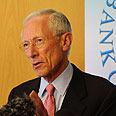
The economic recovery has left Israel's exporters far less exposed to risk, making its central bank's policy of buying up dollars while hiking interest rates increasingly hard to justify, the OECD said on Thursday.
The Bank of Israel has raised its benchmark rate by 1.5 percentage points to 2% the last 15 months to dampen an inflation spike stemming from surging housing prices.
The rate increases have helped drive the shekel higher against the dollar, so the bank has also bought tens of billions of dollars to prevent damage to exporters resulting from a strong local currency.
"The simultaneous use of foreign currency purchases to shield the export sector from adverse exchange-rate movements is increasingly unwarranted," the Organization for Economic Cooperation and Development said in its semi-annual economic outlook.
"Given the economic recovery ... the risks to this sector have diminished substantially."
'Purchases have increased carrying costs'
Foreign exchange imbalances driven by disparities in interest and growth rates have in recent months become a major source of tension between developed and emerging economies, which last week's Group of 20 summit failed to ease.
The OECD said Israel's dollar purchases have increased the carrying costs of holding foreign reserves, which have swelled to some $70 billion.
"An early return to conventional monetary policy should be made, perhaps compensated by a somewhat slower pace of normalization in policy rates," it said.
Annual inflation in Israel, which became a full OECD member earlier this year, stood at 2.5% in October but is expected to reach or exceed 3% in the next year.
"The developments in house prices and inflationary expectations suggest a need to normalize the policy rate fairly quickly," the OECD said.
The OECD said the economy looks set to grow 3.9% in 2010, 4% in 2011 and 4.3% in 2012 and inflation should be at a 2.8% annual rate in the next two years. It expects the key interest rate to rise to 3.5% at the end of 2011 and to 4.5% at the end of 2012.
- Follow Ynetnews on Facebook















